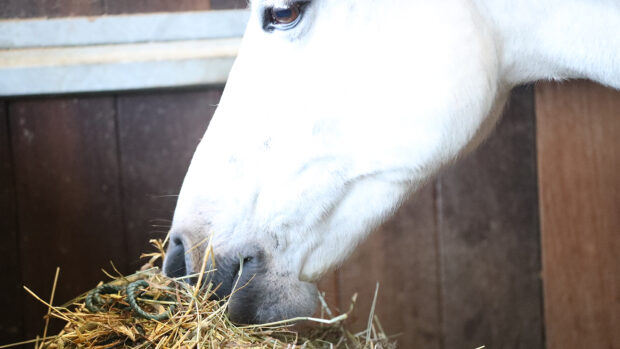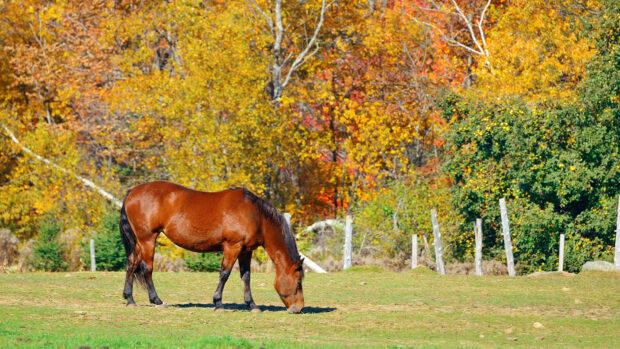Promotional Feature with NAF Equine
As riders and owners most of us are familiar with the well-known problems that our horses’ lungs face through the winter months. But now that summer is here, should we still be looking out for respiratory problems? The answer is yes, absolutely!
It’s not just about dust – summer bring its own challenges to the respiratory system. Summertime-associated respiratory challenges are often linked to pollen. In late spring we tend to move from tree pollen as the major culprit to crops such as rapeseed while grass pollen reaches its highs in early summer. Pollen from common weeds will increase later into the season and into autumn.
With the competitive season rolling from summer through to winter, providing valuable nutritional support to the lungs is wise if your horse is prone to respiratory sensitivity, if your horse wears a nose net, and for immune system support.
How can we manage this?
- Recognise the trigger for your horse and try to remove him from it. This might be as simple as moving to a different paddock away from the trigger trees or crops, or using a physical barrier like a nose-net which can be very useful for some horses
- During very warm weather try to exercise your horse at cooler times of day
- Keep a careful eye on your horse’s weight as excess weight can be an added challenge for a horse’s wellbeing
 What about targeted nutritional support?
What about targeted nutritional support?
NAF recommends maintaining respiratory health by feeding a complex supplement containing:
- Powerful antioxidants such as blueberry and rosehip to support a healthy respiratory function. Research has shown that oxidative stress plays a key part in respiratory challenge in horses¹, and therefore providing natural antioxidants in the diet is recommended
- Herbs and natural extracts with known activity for respiratory health to ensure you’re providing highly targeted support. Echinacea is probably the best known, and furthest researched, and is one natural approach where the chemical constituents and their actions are pretty well understood. Another herb to look out for is liquorice, which is understood to soothe the linings of the respiratory tract.
- Bio-available form of sulphur, such as MSM (methyl sulphonyl methane) as this essential nutrient is indicated for supporting the delicate tissue lining of the respiratory tract, which is easily compromised during respiratory challenge.
- A fast-acting supplement that’s safe to compete on with targeted immune support.
 Choose NAF Five Star Respirator Boost for your horse – the clear way to performance, fast
Choose NAF Five Star Respirator Boost for your horse – the clear way to performance, fast
Knowing you are feeding your horse a brand you can trust is vital to ensuring you too can focus on being at the top of your game with peace of mind that your horse is ready for whatever challenge lies ahead and adhering to Clean Sport.
Respirator Boost contains both MSM and echinacea making it an ideal choice for those concerned by respiratory challenges and provides valuable nutritional support to the respiratory mucosal immune system and the delicate capillary blood vessels that surround the lungs.
Research shows that by supplementing the diet with naturally sourced anti-oxidants, the horse’s lungs can be given valuable support². Respirator Boost contains a concentrated solution of natural anti-oxidants, alongside herbs such as ginger, rosehip and blueberries, chosen for their targeted support of healthy lung function. Echinacea is also included for immune system support and essential oils in Respirator Boost help maintain clear airways.
NAF goes above and beyond to ensure you know exactly what you are buying for your horse. Not only does NAF carry the BETA NOPS logo, the standard quality audit in place to minimise the risk of naturally occurring prohibited substances, the company is also UFAS and GMP+ accredited so knowing whether your product is FEI legal has never been easier.
If you are looking to support your horse’s respiratory system to ensure best possible performance fast, click here
Always consult your vet if you have any concerns regarding your horse’s health and wellbeing.
Research references
- Art T, Kirschvink N, Smith N, Lekeux P (1999) Indices of oxidative stress in blood and pulmonary epithelium lining fluid in horses suffering from recurrent airway obstruction. Equine Veterinary Journal Sep 31(5) 397-401
- Kirschvink N, Fievez L et al (2002) Effect of nutritional antioxidant supplementation on systemic and pulmonary antioxidant status, airway inflammation and lung function in heaves-affected horses. Equine Veterinary Journal. 34(7) 705-12; Kirschvink N, Art T et al (2002) Relationship between markers of blood oxidant status and physiological variables in healthy and heaves-affected horses after exercise. Equine Veterinary Journal Supp Sep (34) 159-64; Larkins NJ, Deaton CM & Jones K (2006) Efficacy of a plant based formulation in the treatment of Recurrent Airway Obstruction in Horses. Planta Medica. Proceedings of Congress. 11(72) 977-978; knightscientific.com; Knight J & Larkins NJ (2003) Antioxidant status of horses BEVA Congress 2003, p.293-294





